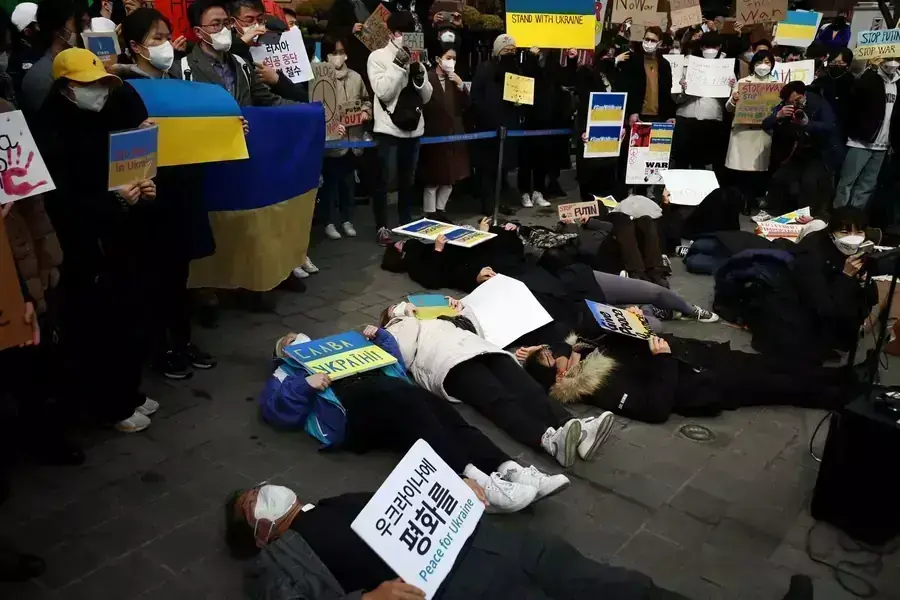Russia’s Invasion of Ukraine and Implications for the Korean Peninsula

Russia’s invasion of Ukraine has provided a two-pronged challenge for South Korean diplomacy. The immediate challenge has been the need for South Korea to craft an effective near-term diplomatic response to the invasion in line with the United States and Europe that effectively meets the expectations of both the Korean public and South Korea’s allies. The second, more consequential geopolitical challenge is the task of ensuring that the revisionist Russian challenge to the status quo in which a nuclear-armed state desires to revise or erase an existing national border does not set a precedent for North Korea, another nuclear-armed state with revisionist geopolitical aspirations toward South Korea’s northern border.
South Korea’s policy toward the Russian invasion of Ukraine has provided a revealing Rorschach test for how South Korea sees its international role. In the face of out-of-area regional crises, South Korea has historically kept its head down and has sought to protect its specific economic interests while doing the minimum effort necessary to satisfy demands and expectations from the United States as its main alliance partner. This is arguably the course of action South Korea took in response to Russian aggression in Crimea in 2014, at which time South Korea did not impose sanctions on Russia.
More on:
But South Korea’s international profile has continued to grow since 2014. Almost a decade later, South Korea is a top ten global economy and was invited to join with G7 powers in England last year. As an international leader, South Korea is expected to hold the line rather than ducking for cover in the face of concerted international action. Most importantly, South Korean public expectations for the government’s response increasingly anticipate that South Korea will be in the vanguard with the other global leaders to uphold international norms such as the inviolability of territorial borders.
South Korea’s announcement of sanctions only on the day of the Russian invasion of Ukraine reflected the country’s focus on its own economic and political considerations. However, the Moon Jae-in administration has since quickly brought South Korea into alignment with the United States and Europe in imposing sanctions on Russia and cooperating with U.S. and European sanctions measures. But close American observers noted that the initial South Korean response was weaker than that of Japan, which imposed its own unilateral sanctions on Russia, while South Korean media fretted over the country’s initial failure to be included on the Joe Biden administration’s list of allies aligned with the United States in its sanctions response. Secretary of State Antony Blinken has expressed satisfaction with South Korean efforts to hold the line on Russian sanctions a week into the conflict. On March 8, President Biden sent a letter of gratitude to President Moon for South Korea’s leadership and actions supporting Ukraine’s sovereignty.
The longer-term and more consequential impact of Russia’s invasion of Ukraine lies with whether Russia’s attempt to erase an international border might stand as a precedent for North Korea, which harbors its own revisionist aspirations regarding the erasure of the armistice line dividing the Korean Peninsula. Those aspirations are probably boosted by the fact that the immediate impact of Russia’s invasion has left a wide-open pathway for North Korea to pursue an even more robust missile-testing regime without fear of consequences from the UN Security Council. Chinese and Russian proposals to weaken Security Council-imposed sanctions on North Korea since December of 2020 had already eviscerated UN-led sanctions for North Korean ballistic missile testing that, in the context of the Ukrainian conflict, have now been shattered.
South Korea must also contend with the fact that though the United States has continued to condemn North Korea’s two latest satellite rocket tests using intermediate-range ballistic missiles in the days following Russia’s invasion of Ukraine, U.S. top-level attention is clearly elsewhere. Conflict in Ukraine will put more pressure on South Korea’s new leader to lead efforts to deter North Korean missile tests, but with few diplomatic tools available to do so. Instead, the task of deterring North Korea’s ongoing testing regime will be an early challenge for South Korea’s next president.
South Korea must carefully watch the nuclear dimensions of Russian aggression out of concern that those lessons might be applied to the peninsula, both with respect to attacks on civilian nuclear power plants and how to handle and effectively deter threats of nuclear use.
More on:
The possibility that North Korea could launch a revisionist campaign to alter the existing border with South Korea might seem unthinkable given South Korea’s conventional power advantages relative to North Korea and its alliance commitment from the United States. In this respect, South Korea’s position on the fault line of a potentially shifting geopolitical tectonic plate remains far stronger compared to that of Ukraine.
But the nuclear dimensions of Russian actions in Ukraine are relevant and bear particularly close scrutiny by South Korea. First, both North and South Korea will be closely watching the impact of Russian threats regarding the risks of nuclear escalation and their implications for the Korean Peninsula. Second, there will be lessons for the two Koreas related to Russian efforts to secure control over Ukrainian nuclear power plants and the challenge of how to ensure the safety and security of civilian nuclear energy plants during a military conflict.
 Online Store
Online Store
